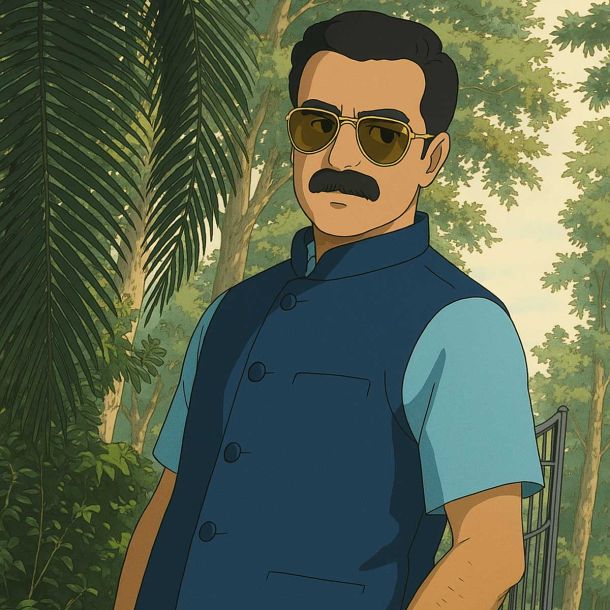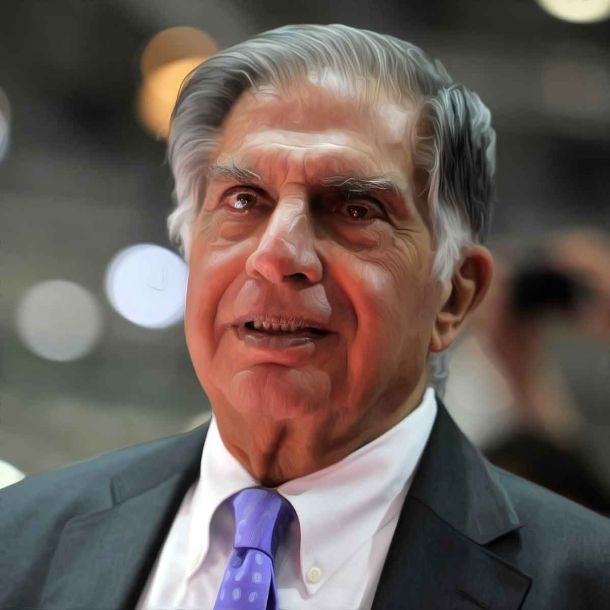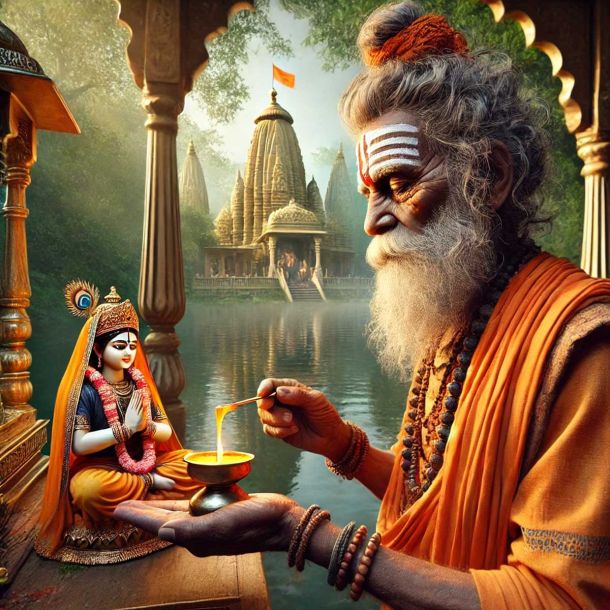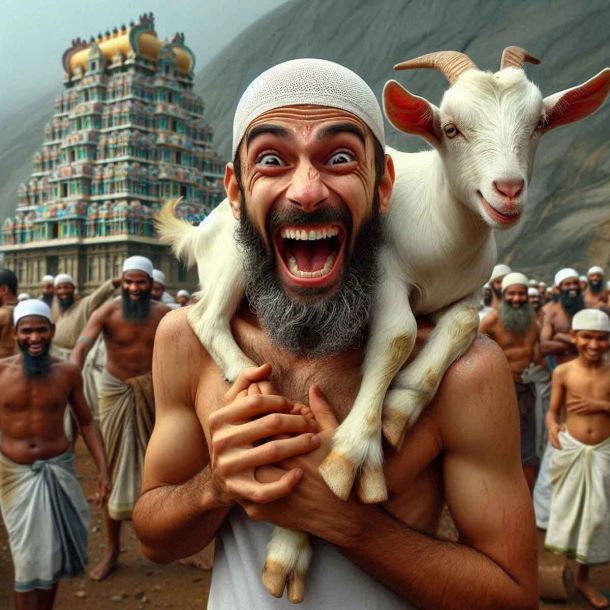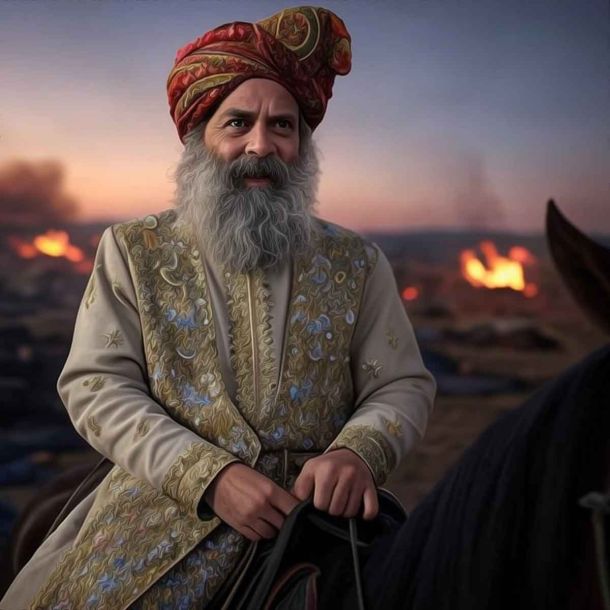More Coverage
Twitter Coverage
Satyaagrah
Written on
Satyaagrah
Written on
Satyaagrah
Written on
Satyaagrah
Written on
Satyaagrah
Written on
Join Satyaagrah Social Media
"Ram Lalla gave me the order, I just followed it": Arun Yogiraj shares he can never replicate the idol carved from 2.5 billion-year-old Krishna Shila, witnessing Prabhu’s face undergo a mystical change post-Alankar decor, etching a once-in-eternity smile
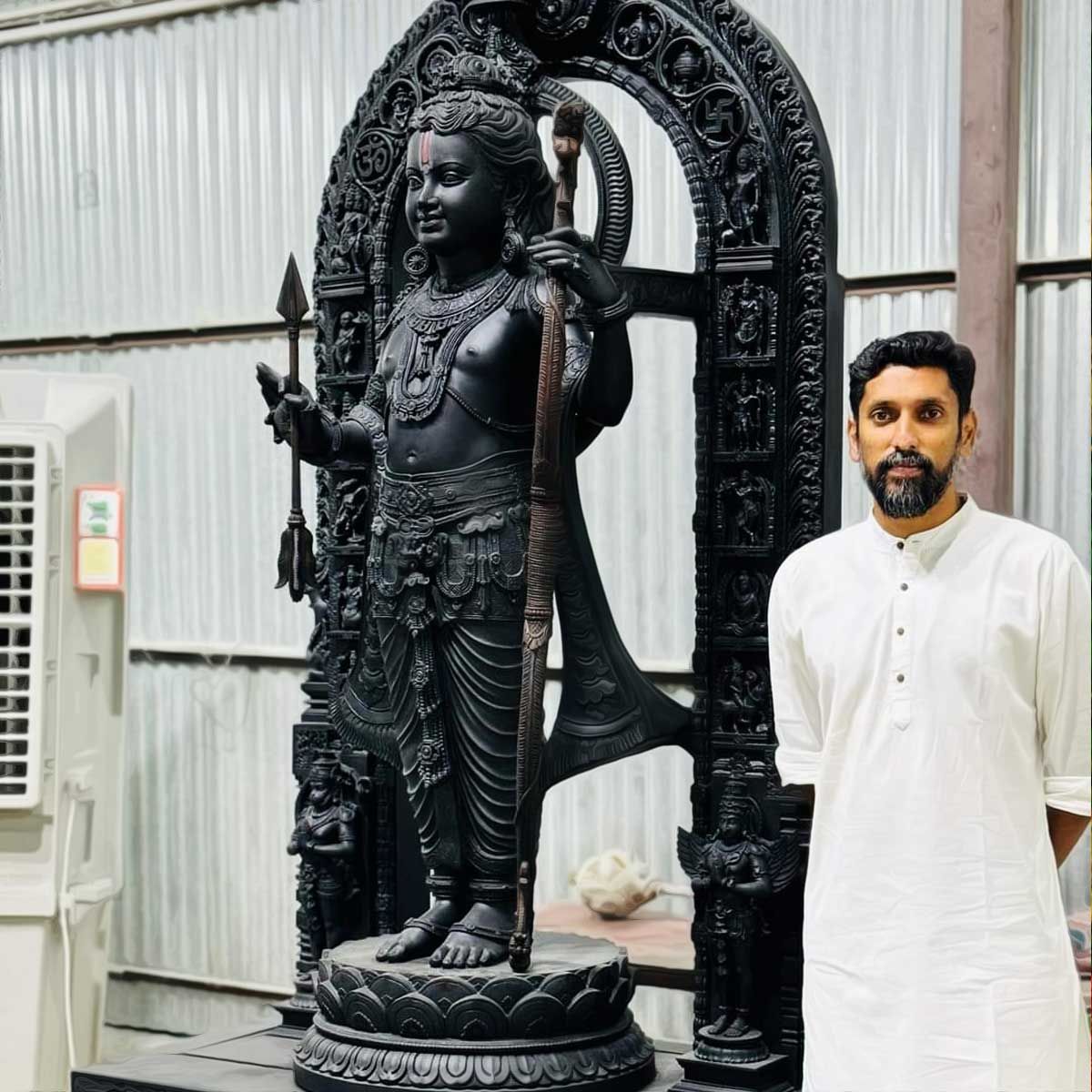
In the heart of every believer is a deep-seated understanding that we are merely vessels through which the divine expresses itself. This profound realization has been beautifully embodied by Arun Yogiraj, a Mysuru-based sculptor, who has recently etched his name in the annals of spiritual history. Arun has achieved a unique distinction by crafting the baal-swaroop idol of Bhagwan Ram Lalla, a sacred image destined for the revered Ayodhya Ram Mandir. This creation is not just an artistic triumph but a spiritual journey, intertwining the mortal and the divine.
The journey of Arun Yogiraj is a testament to the belief that when one surrenders to a higher power, extraordinary feats can be accomplished. His hands, guided by faith and devotion, sculpted an idol that is not just a representation of Lord Ram but a manifestation of the deity's essence. The unveiling of this idol during the Pran Pratishtha ceremony, a moment of spiritual awakening for many, revealed a divine transformation. The moment the scarf was lifted from the Achal Murti, an outpouring of love and reverence ensued. Devotees from far and wide were left in awe, their eyes witnessing not just an idol but the living presence of Lord Ram. It was a moment that transcended the barriers of art and entered the realm of the mystical.
Arun Yogiraj’s work has become a focal point of devotional emotion, resonating deeply with the hearts of countless devotees. The experience of seeing the idol, especially after the Alankar (decorative) ceremonies, is said to be transformative. There is a belief among the faithful that the face of the idol, once adorned, has undergone a divine change – an alteration that is not just physical but spiritual. This change, as Arun himself humbly acknowledges, is beyond his artistic capabilities to replicate. It's as if Bhagwan Ram, through the process of Alankar, has infused the idol with a life force that is unique and irreplicable.
Arun Yogiraj's statement, "Ram ordered, I just followed," reflects a profound humility and devotion. It speaks volumes of a man who sees himself not as the creator but as an instrument of a divine will.
— ITIKA 🥀 (@ITI0099) January 24, 2024 |
“Ram Lalla gave me the order, I just followed it”
Arun Yogiraj, the sculptor whose hands have brought divine visions to tangible reality, shared a unique and spiritually profound experience in an interview with IndiaToday. His journey in carving the idol of Ram Lalla for the Ayodhya Ram Mandir took a mystical turn during the consecration ceremony. This experience transcends the boundaries of mere artistry, delving into the depths of spiritual revelation.
In his interview, Arun Yogiraj opened up about an extraordinary transformation he observed in the idol. He noted, “No, I cannot make it again. The idol looked different during the making. For ten days I was there only to give some markings and other things. After the Alankar (decoration) was done, I was sitting before the idol and I realized that this is not my creation. After going inside (the Garbh Griha) Bhagwan changed a lot. I even shared this with people sitting near me that Bhagwan is looking very different from what I carved. The eyes looked different while I was carving Ram Lalla and the eyes look different after Pran Pratishtha. Bhagwan has taken a different look altogether. I am sure I can’t repeat it again,” reflecting his awe at the divine transformation that seemed to have taken place right before his eyes.
Yogiraj's revelation, “Mere lalla ne mujhe aadesh diya, maine follow kiya (Lord Ram gave me the order, and I just followed it),” speaks to his profound sense of being a conduit for a higher purpose. His dedication to adhering to the Shilpa Shastra, the ancient Indian treatise on sculpture, in representing a five-year-old form of Lord Ram, captures not just the physical attributes but the essence of divine innocence. This devotion to his craft and spiritual adherence to the divine guidelines illuminates the humility and faith that guides his work.
The sculptor’s humility is further evident in his response to the nation's outpouring of love and appreciation. Overwhelmed and elated, Arun Yogiraj expresses a deep sense of gratitude, not for personal acclaim, but for the acceptance and love that the nation has shown towards the idol. His statement, “It’s not about my idol getting selected but the nation should have to like it. We had to believe that we were making Ram and he will come inside the idol we are carving,” reflects a belief that transcends the physical act of carving an idol, embracing a spiritual journey where the divine essence of Lord Ram is invoked and realized.
In a heartfelt expression of gratitude, Arun Yogiraj turned to social media, sharing pictures of Ram Lalla and writing, “Thank You Ayodhya.” This simple yet profound statement encapsulates his journey, one that is not just about artistic accomplishment but a deeper spiritual communion, a blessed experience that has resonated with a nation and beyond.
|
The Hanuman Ji Connection
In a story that intertwines the mystical with the mundane, Arun Yogiraj, the sculptor of Ram Lalla's idol, shares an extraordinary encounter during the seven months he spent carving the divine figure. Each day, as if guided by a celestial script, a routine event unfolded that Yogiraj believed was nothing short of miraculous. He recounted, “When, during the cold, we covered the gate, it used to come and bang on the door. I wasn’t sure if it was the same monkey, but it used to come daily at the same time. I told Champat Rai ji, the general secretary of Shri Ram Janmabhoomi Teerth Kshetra Trust, about it, and he said that maybe it also wants to see Lord Ram’s idol.” This daily visitation by a monkey around 5 pm, which Yogiraj believed to be Hanuman Ji, became a symbolic connection to the divine narrative of Lord Ram, bridging the realms of spirituality and the natural world.
The Hardwork Behind Ram Lalla’s Mesmerising Smile
Diving deeper into the artistic and spiritual journey, Yogiraj shed light on the dedication and discipline behind the captivating smile of Ram Lalla. Carving from stone, a medium that offers no room for error, required Yogiraj to immerse himself completely in his work. “I had to spend a lot of time with children, and I felt disconnected from the outside world,” he revealed, highlighting the deep level of commitment and solitude involved in his artistic process. The sculptor’s dedication to capturing the essence of childhood innocence in Ram Lalla's smile was a task of both artistic skill and spiritual devotion.
Yogiraj's journey was not just about shaping stone but about bringing alive emotions and expressions within it. He shared, “It is not easy to bring bhaav (emotion) in a stone, and you have to spend a lot of time with it. So I decided I would be spending a lot of time with the stone, do my homework, study kids’ features, and everything else happened due to Ram Lalla.” His approach was methodical yet deeply intuitive, blending artistic precision with spiritual intuition.
An old interview of Arun Yogiraj, now going viral, sheds further light on his struggles and the meticulous process behind the creation of the idol. He detailed, “It was tough even for us, we struggled a lot for 6 months to look for him in the stone. So, there has been a calculation made by scientists that the sun’s rays will fall upon Rama’s forehead on the day of Rama Navami. So they gave us the measurement of 51 inches.” This revelation about the scientific and spiritual dimensions merging in the creation process adds another layer of depth to Yogiraj's work, illustrating the blend of ancient wisdom and modern science in bringing the divine idol to life.
The Divine Expression on Ram Lalla’s Face That Has Captivated the Nation
In the creation of the idol of Ram Lalla, every detail was imbued with a deep sense of devotion and care, extending even to the choice of stone. Arun Yogiraj, mindful of the spiritual and physical well-being of the devotees, shared a significant consideration that went into the selection process. He said, “See, during the testing, we get to know that the milk doesn’t see any reaction. Stones are porous and have some mica content, the Teertha from those stones are unfit for human consumption.” This meticulous attention to the stone's properties ensured that when rituals like Abhishek, where milk is poured over the idol, are performed, the milk remains pure and safe for consumption as ‘prasad’. The chosen stone, being unreactive, ensures that the sanctity and healthfulness of the milk are preserved, reflecting the holistic approach taken in every aspect of the idol's creation.
When discussing the selection of the idol for the Ayodhya Ram Mandir, Yogiraj’s humility and devotion shine through. He expressed, “I will be happy even if their idol is selected. In the end, Rama should look beautiful, splendid, dignified and look like a child at the same time and give Darshana to all.”
|
2.5 Billion Years Old Krishna Shila Used in Making Ram Lalla Idol
In an awe-inspiring fusion of spirituality and geological wonder, the idol of Ram Lalla, a symbol of divine grace, has been sculpted from a material as ancient as time itself. The ‘Krishna Shila’ or ‘Shyam Shila’ (black granite stone) used in the making of this sacred idol is approximately 2.5 billion years old. This stone, hailing from the Jayapura Hobli village in Karnataka's Mysuru district, was chosen from an area renowned for its high-quality granite mines. Such a choice highlights a profound connection between the divine and the eternal elements of nature.
The selection of this stone was not just based on its age-old presence but also on its quality, ascertained by rigorous testing. The National Institute of Rock Mechanics (NIRM), a prestigious institution responsible for testing rocks for critical infrastructure like dams and nuclear power plants in India, conducted these tests. Their analysis at laboratories in Kolar Gold Fields concluded that the granite block was “massive, melanocratic, and uniform in colour, devoid of any internal cracks and fractures.” This description underscores the stone's integrity, ensuring that it is not only ancient but also robust and flawless, befitting the divine image it was meant to embody.
The Krishna Shila's fine-grained, hard, and compact nature further adds to its suitability for carving a deity. These physical attributes, combined with its ancient origin, imbue the idol of Ram Lalla with a sense of timelessness and durability, reflecting the eternal nature of the divine.
Arun Yogiraj, the sculptor behind this divine creation, has a repertoire that extends beyond the Ram Lalla idol. His other notable works include the magnificent idol of Adi Shankaracharya at Kedarnath, showcasing his versatility and mastery in working with different materials and themes. In Mysuru, he sculpted the 14.5-feet tall white marble statue of Maharaja Jayachamarajendra Wodeyar, demonstrating his skill in capturing both the divine and the regal. Further, his creation of the life-size White marble sculpture of Swami Ramakrishna Paramahamsa and various statues at the railway station speak to his artistic breadth and the depth of his talent.
|
Arun Yogiraj, the Fifth-Generation Sculptor
Arun Yogiraj is not just a craftsman but a bearer of a rich legacy. He belongs to an esteemed lineage of sculptors, with the artistry running in his blood as a fifth-generation sculptor. His father, Yogiraj Shilpi, was one among the eight children of B Basavanna Shilpi, a distinguished artist of the Mysuru palace. The artistic prowess of his family is evident in significant works, such as the idol of Kaveri on the Krishna Raja Sagar Dam, crafted by his grandfather. This family heritage not only shaped Arun's skills but also ingrained in him a deep reverence for traditional art forms.
The lineage of Yogiraj traces back to Shilpa Sri Siddhalinga Swami, an illustrious sculptor to the royal family of Mysuru, who was the teacher of Basavanna Shilpi. Siddhalinga Swami, renowned for his architectural brilliance, is credited with designing the domes of the Vidhana Soudha in Bengaluru, a testament to his skill and vision. Basavanna Shilpi, joining Swami’s Gurukul in 1931, honed his craft under the tutelage of this master for a quarter of a century. This rich heritage of learning and artistry has been passed down to Arun, making him not just a sculptor but a custodian of a profound artistic tradition.
|
Ram Lalla Pran Pratishtha
The Pran Pratishtha of the Bhavya Ram Mandir in Ayodhya was conducted by the hands of PM Narendra Modi on 22nd January 2024, marked a historic and divine moment. The grand idol of Shri Ram’s Baal Swarup, crafted by Yogiraj, was consecrated, symbolizing the physical embodiment and spiritual awakening of the deity. This idol has now become a revered symbol for over a billion Hindus across the globe, a testament to the profound impact of Yogiraj's work.
The consecration ceremony was a grand and solemn event, with 15 “Yajmans” participating. Among them, RSS leader Anil Mishra and his wife Usha were the mukhya or pradhan yajman, playing a pivotal role in the rituals. The ceremony was not just a religious rite but a cultural celebration, uniting millions in a shared moment of reverence and joy.
 Support Us
Support Us
Satyagraha was born from the heart of our land, with an undying aim to unveil the true essence of Bharat. It seeks to illuminate the hidden tales of our valiant freedom fighters and the rich chronicles that haven't yet sung their complete melody in the mainstream.
While platforms like NDTV and 'The Wire' effortlessly garner funds under the banner of safeguarding democracy, we at Satyagraha walk a different path. Our strength and resonance come from you. In this journey to weave a stronger Bharat, every little contribution amplifies our voice. Let's come together, contribute as you can, and champion the true spirit of our nation.
 |  |  |
| ICICI Bank of Satyaagrah | Razorpay Bank of Satyaagrah | PayPal Bank of Satyaagrah - For International Payments |
If all above doesn't work, then try the LINK below:
Please share the article on other platforms
DISCLAIMER: The author is solely responsible for the views expressed in this article. The author carries the responsibility for citing and/or licensing of images utilized within the text. The website also frequently uses non-commercial images for representational purposes only in line with the article. We are not responsible for the authenticity of such images. If some images have a copyright issue, we request the person/entity to contact us at This email address is being protected from spambots. You need JavaScript enabled to view it. and we will take the necessary actions to resolve the issue.
Related Articles
- "रघुकुल रीत सदा चल आई, प्राण जाई पर वचन न जाई" | 86 year old Pandit Laxmikant Mathuranath Dixit whose ancestors presided over coronation ceremony of Chhatrapati Shivaji Maharaj will lead the Pran Pratishtha ceremony at Ayodhya Ram Mandir
- Teary-eyed Sadhvi Rithambara and Uma Bharti's emotional embrace at Ram Mandir's Pran Pratishtha, Janakpur's 125,000 Diyas celebration, PM Modi honoring the shramiks, and Arun Yogiraj's revered Shri Ram idol creation, culminate in a historic, divine event
- "राम लल्ला विराजमान": Amidst fervent devotion, Ayodhya's Ram Mandir stands tall, facing controversies head-on, as PM Modi graces the Pran Pratishtha, the temple, with Ram Lalla's idol by Arun Yogiraj, symbolizes a historic confluence of faith and dispute
- "After five centuries": Step into the divine embrace of Ram Mandir's sanctum-sanctorum, where the idol of Ram Lalla would be installed as Ram Mandir Trust unveils its beauty, feel the sacred aura & witness culmination of devotion in every gleaming light
- “True wisdom consists only in the knowledge of Brahman”: Budhanilkantha (Old Blue Throat) Temple, Nepal is a Hindu open air temple dedicated to Mahavishnu, also known as the Narayanan Temple, and can be identified by a large reclining statue of Mahavishnu
- Hindu side filed reply in Supreme Court: 'Gyanvapi property belonged to Lord Adi Vishweshwar since time immemorial, even before the Islamic rule in India, and hence cannot be handed to anybody'
- 'Dream becomes determination and determination becomes reality': Mahmood Begda destroyed Shikhara and Sadanshah Peer Dargah was constructed atop, after 500 years PM Modi unfurls ‘dhwaja’ at Kalika temple at Pavagadh
- "Miracles are not contrary to nature, but only contrary to what we know about nature": Behold the sacred marvel nestled within the heart of Shillong, Meghalaya—the Swayambho Shiv Ling in Mawjymbuin Caves drawing devotees from all corners of the country
- "चलाक मंदबुद्धि": Muslim man Sher Khan pelts stones at Ram Temple, threatens Mahant, claiming the temple belongs to Muslims; Mahant Arun Chaudhary asserts Sher Khan is faking mental instability, only targeting Hindus and making a fool out of everyone
- In a landmark revelation, ASI's Gyanvapi report claims a temple predating the mosque, with pillars & carvings intact, amidst a storm of cultural debate, pre-Aurangzeb-era relics fuel a historic reckoning for India's heritage, Owaisi and coterie cries fowl
- 1200 years old rarest idol of Lord Narasimha and devotee Prahlada identified in Qutub Minar complex by renowned archaeologist Dharamveer Sharma: special attraction for religious and researching community
- The Lost City of Dwarka and step-motherly treatment to it's Archaeological excavations as revealed by RTI: Shocking state of neglect for Hindu sites by the Government
- Shivling discovered in the Gyanvapi complex during a survey after the water was pumped out of a well that Muslims were using as 'Wuzukhana' for washing their hands and feet before offering Namaz
- In the wake of the Madras HC's order banning non-Hindus from temple entry, Tirumala Tirupati Devasthanams' announcement to explore Muslims participation in Srivari Seva challenges traditional boundaries, igniting a complex debate on inclusivity & sanctity
- Why look for Shivling in every mosque: RSS chief Mohan Bhagwat on Gyanvapi says 'it is a matter of faith for Hindus, issue should be settled amicably', but advises against opening battles in every mosque
